Leadership and Cultures in Organizations: Challenges and Theories
VerifiedAdded on 2023/05/29
|15
|4747
|150
Report
AI Summary
This report delves into the multifaceted concept of leadership within organizational contexts, emphasizing its crucial role in achieving long-term organizational success and effectiveness. It explores the interplay between leadership and organizational culture, highlighting how a positive culture fosters effective leadership practices. The report identifies both macro-level challenges, such as managing competition and innovation, and micro-level challenges, including maintaining harmony, effective communication, and employee development. It further examines the significance of character, ethics, values, and beliefs in leadership, along with relevant leadership theories like trait theory and behavioral theory. The report also addresses motivation, employee engagement, talent management, and the application of Belbin team roles in leadership. Through examples and analysis, the report provides insights into how leaders can navigate complex organizational dynamics and drive positive outcomes.
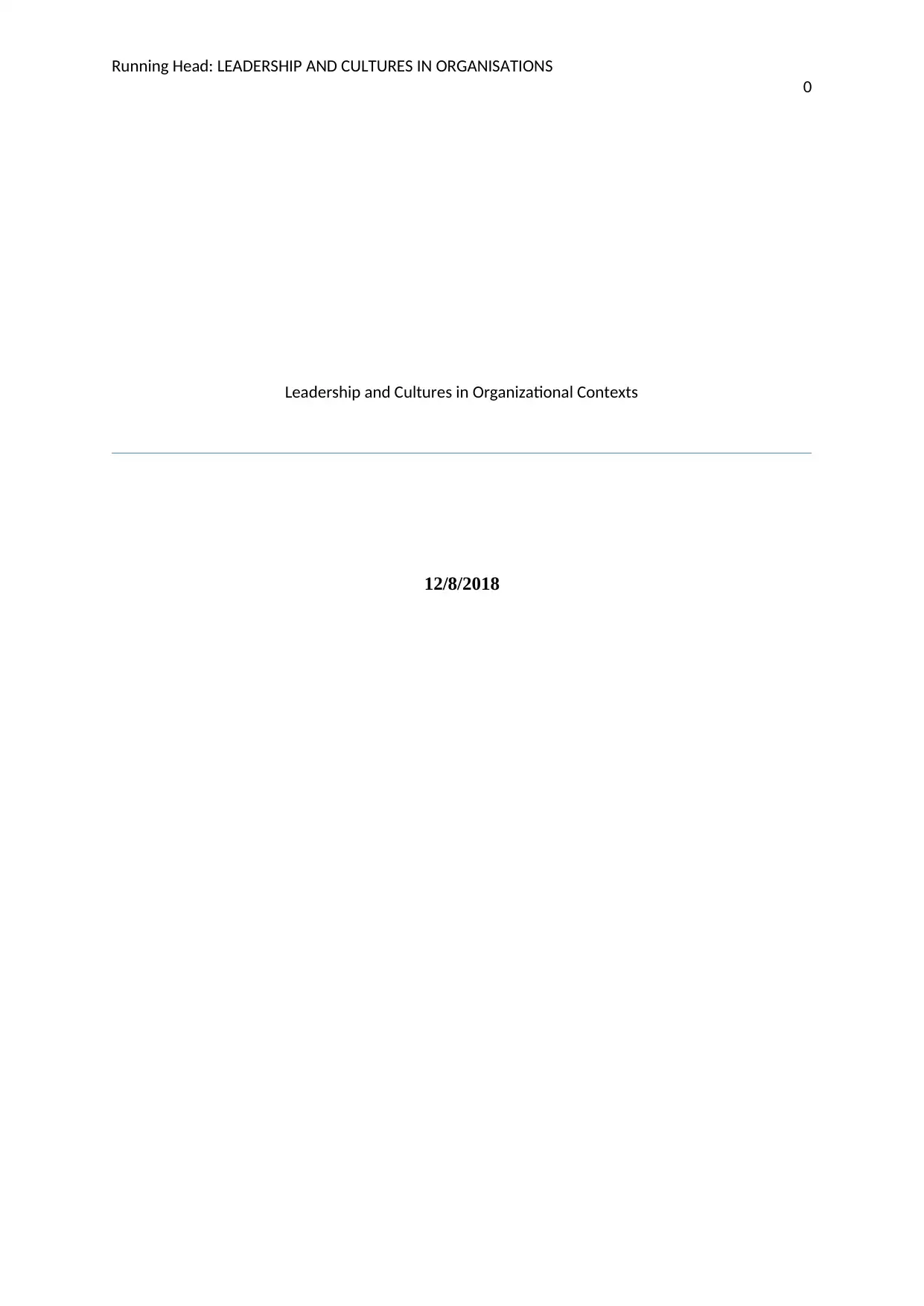
Running Head: LEADERSHIP AND CULTURES IN ORGANISATIONS
0
Leadership and Cultures in Organizational Contexts
12/8/2018
0
Leadership and Cultures in Organizational Contexts
12/8/2018
Paraphrase This Document
Need a fresh take? Get an instant paraphrase of this document with our AI Paraphraser
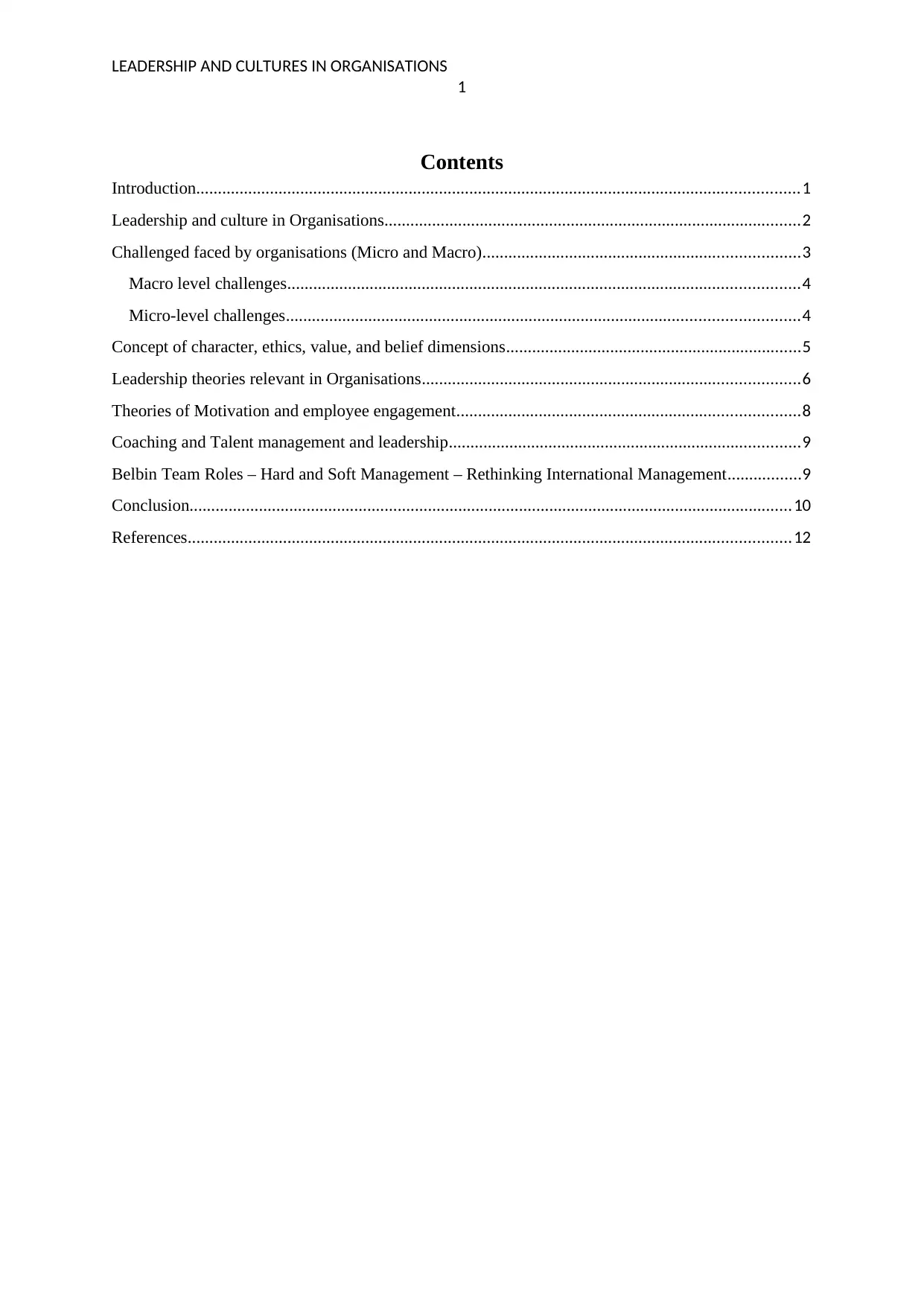
LEADERSHIP AND CULTURES IN ORGANISATIONS
1
Contents
Introduction...........................................................................................................................................1
Leadership and culture in Organisations................................................................................................2
Challenged faced by organisations (Micro and Macro).........................................................................3
Macro level challenges......................................................................................................................4
Micro-level challenges......................................................................................................................4
Concept of character, ethics, value, and belief dimensions....................................................................5
Leadership theories relevant in Organisations.......................................................................................6
Theories of Motivation and employee engagement...............................................................................8
Coaching and Talent management and leadership.................................................................................9
Belbin Team Roles – Hard and Soft Management – Rethinking International Management.................9
Conclusion...........................................................................................................................................10
References...........................................................................................................................................12
1
Contents
Introduction...........................................................................................................................................1
Leadership and culture in Organisations................................................................................................2
Challenged faced by organisations (Micro and Macro).........................................................................3
Macro level challenges......................................................................................................................4
Micro-level challenges......................................................................................................................4
Concept of character, ethics, value, and belief dimensions....................................................................5
Leadership theories relevant in Organisations.......................................................................................6
Theories of Motivation and employee engagement...............................................................................8
Coaching and Talent management and leadership.................................................................................9
Belbin Team Roles – Hard and Soft Management – Rethinking International Management.................9
Conclusion...........................................................................................................................................10
References...........................................................................................................................................12
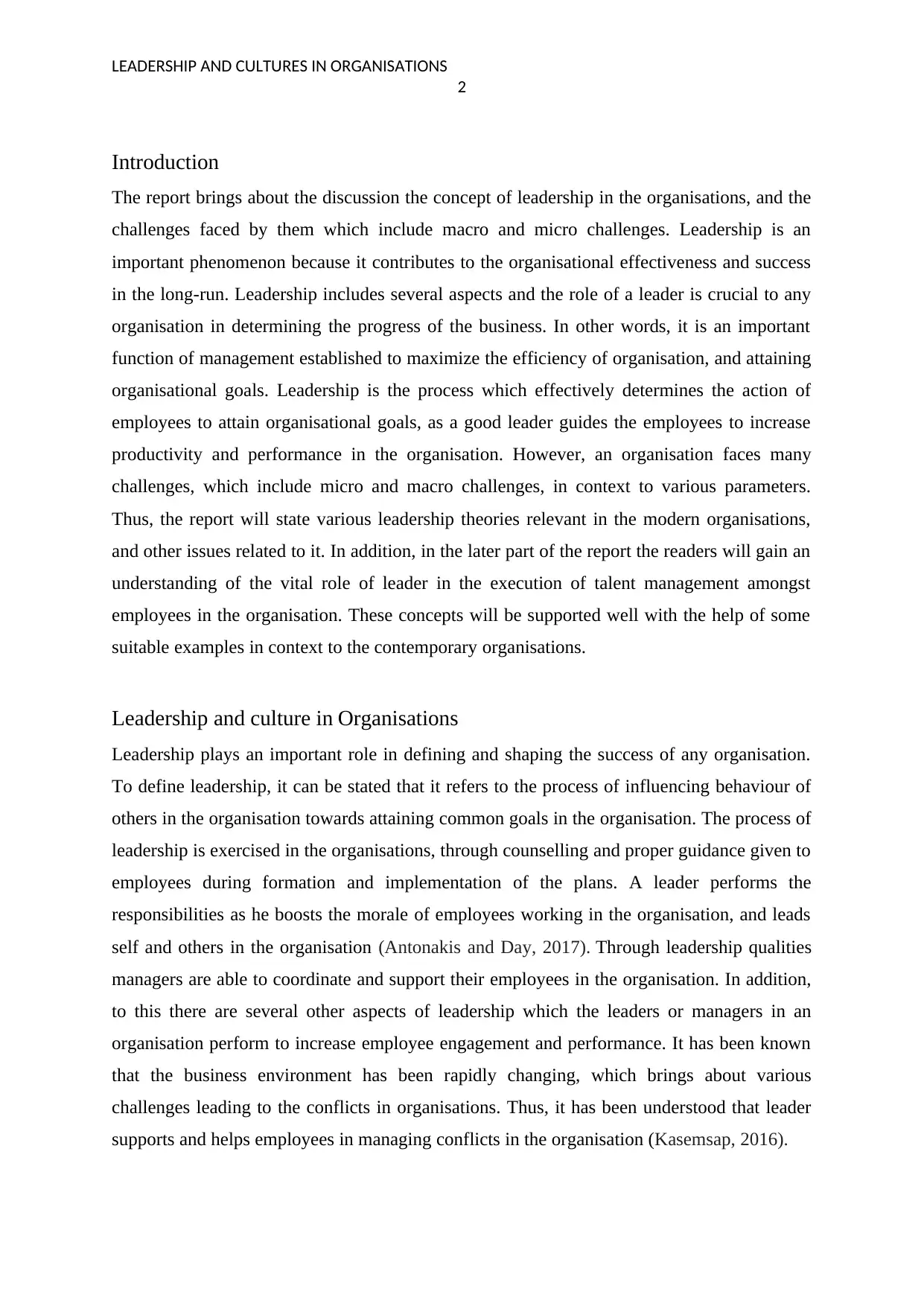
LEADERSHIP AND CULTURES IN ORGANISATIONS
2
Introduction
The report brings about the discussion the concept of leadership in the organisations, and the
challenges faced by them which include macro and micro challenges. Leadership is an
important phenomenon because it contributes to the organisational effectiveness and success
in the long-run. Leadership includes several aspects and the role of a leader is crucial to any
organisation in determining the progress of the business. In other words, it is an important
function of management established to maximize the efficiency of organisation, and attaining
organisational goals. Leadership is the process which effectively determines the action of
employees to attain organisational goals, as a good leader guides the employees to increase
productivity and performance in the organisation. However, an organisation faces many
challenges, which include micro and macro challenges, in context to various parameters.
Thus, the report will state various leadership theories relevant in the modern organisations,
and other issues related to it. In addition, in the later part of the report the readers will gain an
understanding of the vital role of leader in the execution of talent management amongst
employees in the organisation. These concepts will be supported well with the help of some
suitable examples in context to the contemporary organisations.
Leadership and culture in Organisations
Leadership plays an important role in defining and shaping the success of any organisation.
To define leadership, it can be stated that it refers to the process of influencing behaviour of
others in the organisation towards attaining common goals in the organisation. The process of
leadership is exercised in the organisations, through counselling and proper guidance given to
employees during formation and implementation of the plans. A leader performs the
responsibilities as he boosts the morale of employees working in the organisation, and leads
self and others in the organisation (Antonakis and Day, 2017). Through leadership qualities
managers are able to coordinate and support their employees in the organisation. In addition,
to this there are several other aspects of leadership which the leaders or managers in an
organisation perform to increase employee engagement and performance. It has been known
that the business environment has been rapidly changing, which brings about various
challenges leading to the conflicts in organisations. Thus, it has been understood that leader
supports and helps employees in managing conflicts in the organisation (Kasemsap, 2016).
2
Introduction
The report brings about the discussion the concept of leadership in the organisations, and the
challenges faced by them which include macro and micro challenges. Leadership is an
important phenomenon because it contributes to the organisational effectiveness and success
in the long-run. Leadership includes several aspects and the role of a leader is crucial to any
organisation in determining the progress of the business. In other words, it is an important
function of management established to maximize the efficiency of organisation, and attaining
organisational goals. Leadership is the process which effectively determines the action of
employees to attain organisational goals, as a good leader guides the employees to increase
productivity and performance in the organisation. However, an organisation faces many
challenges, which include micro and macro challenges, in context to various parameters.
Thus, the report will state various leadership theories relevant in the modern organisations,
and other issues related to it. In addition, in the later part of the report the readers will gain an
understanding of the vital role of leader in the execution of talent management amongst
employees in the organisation. These concepts will be supported well with the help of some
suitable examples in context to the contemporary organisations.
Leadership and culture in Organisations
Leadership plays an important role in defining and shaping the success of any organisation.
To define leadership, it can be stated that it refers to the process of influencing behaviour of
others in the organisation towards attaining common goals in the organisation. The process of
leadership is exercised in the organisations, through counselling and proper guidance given to
employees during formation and implementation of the plans. A leader performs the
responsibilities as he boosts the morale of employees working in the organisation, and leads
self and others in the organisation (Antonakis and Day, 2017). Through leadership qualities
managers are able to coordinate and support their employees in the organisation. In addition,
to this there are several other aspects of leadership which the leaders or managers in an
organisation perform to increase employee engagement and performance. It has been known
that the business environment has been rapidly changing, which brings about various
challenges leading to the conflicts in organisations. Thus, it has been understood that leader
supports and helps employees in managing conflicts in the organisation (Kasemsap, 2016).
⊘ This is a preview!⊘
Do you want full access?
Subscribe today to unlock all pages.

Trusted by 1+ million students worldwide
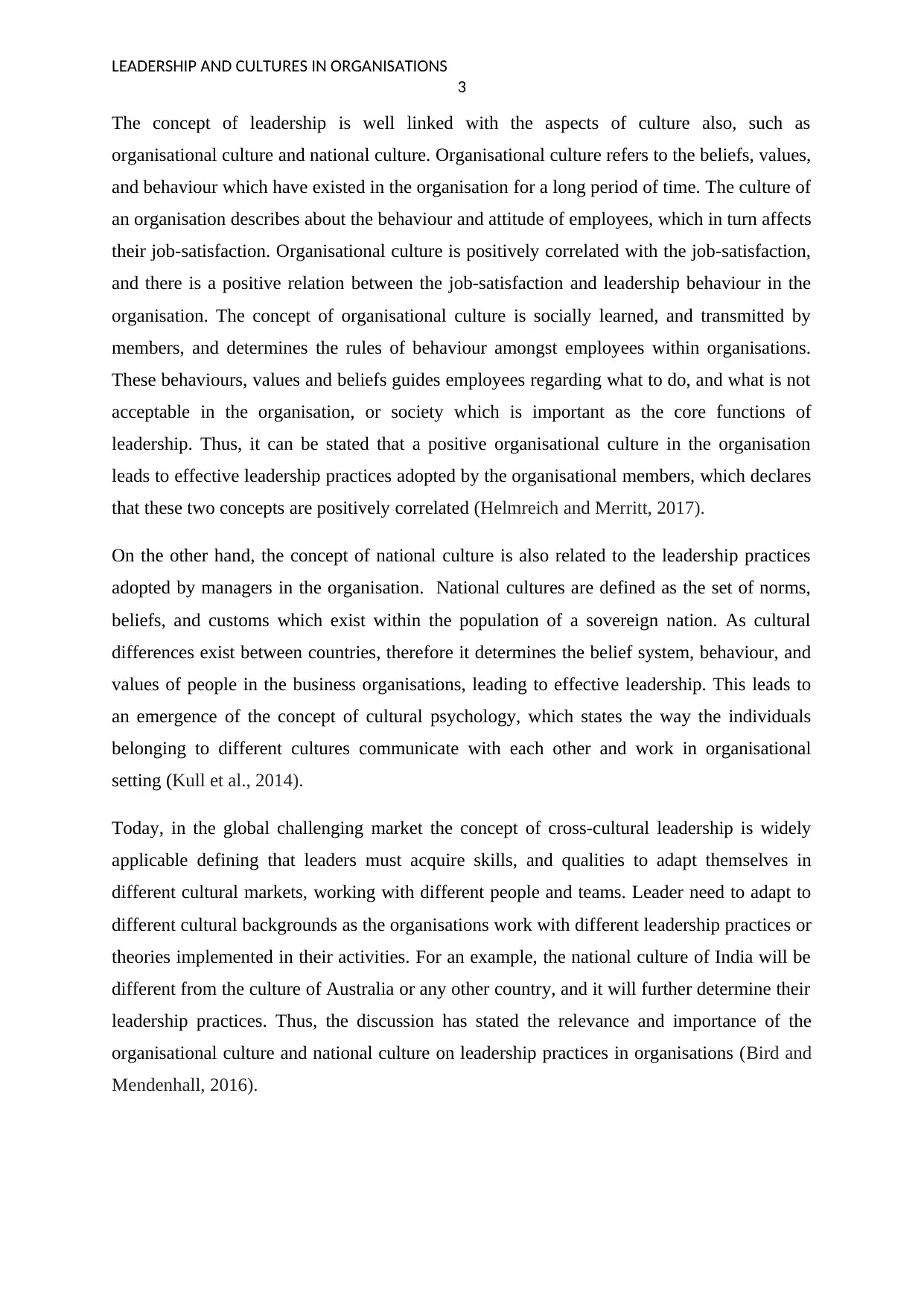
LEADERSHIP AND CULTURES IN ORGANISATIONS
3
The concept of leadership is well linked with the aspects of culture also, such as
organisational culture and national culture. Organisational culture refers to the beliefs, values,
and behaviour which have existed in the organisation for a long period of time. The culture of
an organisation describes about the behaviour and attitude of employees, which in turn affects
their job-satisfaction. Organisational culture is positively correlated with the job-satisfaction,
and there is a positive relation between the job-satisfaction and leadership behaviour in the
organisation. The concept of organisational culture is socially learned, and transmitted by
members, and determines the rules of behaviour amongst employees within organisations.
These behaviours, values and beliefs guides employees regarding what to do, and what is not
acceptable in the organisation, or society which is important as the core functions of
leadership. Thus, it can be stated that a positive organisational culture in the organisation
leads to effective leadership practices adopted by the organisational members, which declares
that these two concepts are positively correlated (Helmreich and Merritt, 2017).
On the other hand, the concept of national culture is also related to the leadership practices
adopted by managers in the organisation. National cultures are defined as the set of norms,
beliefs, and customs which exist within the population of a sovereign nation. As cultural
differences exist between countries, therefore it determines the belief system, behaviour, and
values of people in the business organisations, leading to effective leadership. This leads to
an emergence of the concept of cultural psychology, which states the way the individuals
belonging to different cultures communicate with each other and work in organisational
setting (Kull et al., 2014).
Today, in the global challenging market the concept of cross-cultural leadership is widely
applicable defining that leaders must acquire skills, and qualities to adapt themselves in
different cultural markets, working with different people and teams. Leader need to adapt to
different cultural backgrounds as the organisations work with different leadership practices or
theories implemented in their activities. For an example, the national culture of India will be
different from the culture of Australia or any other country, and it will further determine their
leadership practices. Thus, the discussion has stated the relevance and importance of the
organisational culture and national culture on leadership practices in organisations (Bird and
Mendenhall, 2016).
3
The concept of leadership is well linked with the aspects of culture also, such as
organisational culture and national culture. Organisational culture refers to the beliefs, values,
and behaviour which have existed in the organisation for a long period of time. The culture of
an organisation describes about the behaviour and attitude of employees, which in turn affects
their job-satisfaction. Organisational culture is positively correlated with the job-satisfaction,
and there is a positive relation between the job-satisfaction and leadership behaviour in the
organisation. The concept of organisational culture is socially learned, and transmitted by
members, and determines the rules of behaviour amongst employees within organisations.
These behaviours, values and beliefs guides employees regarding what to do, and what is not
acceptable in the organisation, or society which is important as the core functions of
leadership. Thus, it can be stated that a positive organisational culture in the organisation
leads to effective leadership practices adopted by the organisational members, which declares
that these two concepts are positively correlated (Helmreich and Merritt, 2017).
On the other hand, the concept of national culture is also related to the leadership practices
adopted by managers in the organisation. National cultures are defined as the set of norms,
beliefs, and customs which exist within the population of a sovereign nation. As cultural
differences exist between countries, therefore it determines the belief system, behaviour, and
values of people in the business organisations, leading to effective leadership. This leads to
an emergence of the concept of cultural psychology, which states the way the individuals
belonging to different cultures communicate with each other and work in organisational
setting (Kull et al., 2014).
Today, in the global challenging market the concept of cross-cultural leadership is widely
applicable defining that leaders must acquire skills, and qualities to adapt themselves in
different cultural markets, working with different people and teams. Leader need to adapt to
different cultural backgrounds as the organisations work with different leadership practices or
theories implemented in their activities. For an example, the national culture of India will be
different from the culture of Australia or any other country, and it will further determine their
leadership practices. Thus, the discussion has stated the relevance and importance of the
organisational culture and national culture on leadership practices in organisations (Bird and
Mendenhall, 2016).
Paraphrase This Document
Need a fresh take? Get an instant paraphrase of this document with our AI Paraphraser
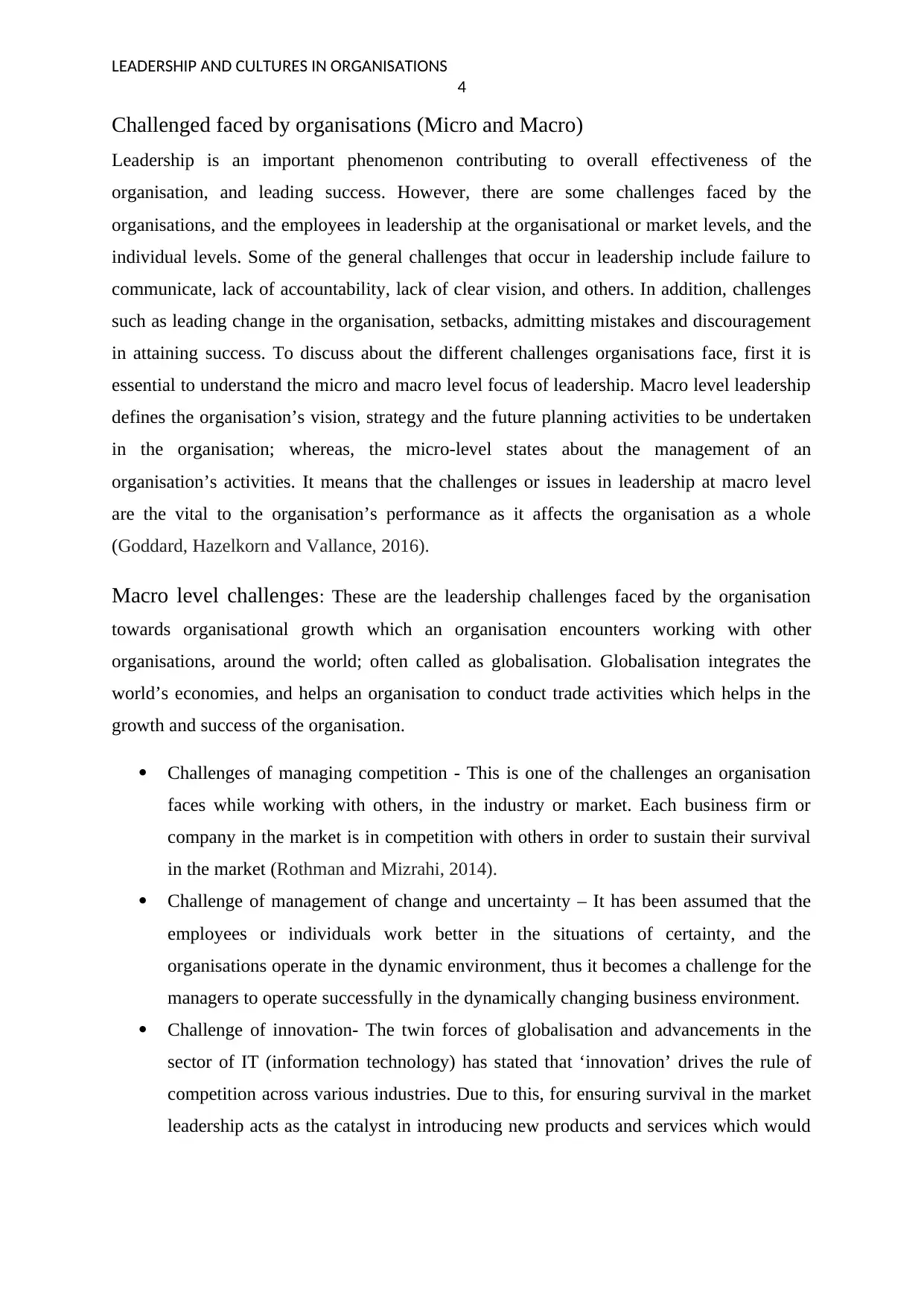
LEADERSHIP AND CULTURES IN ORGANISATIONS
4
Challenged faced by organisations (Micro and Macro)
Leadership is an important phenomenon contributing to overall effectiveness of the
organisation, and leading success. However, there are some challenges faced by the
organisations, and the employees in leadership at the organisational or market levels, and the
individual levels. Some of the general challenges that occur in leadership include failure to
communicate, lack of accountability, lack of clear vision, and others. In addition, challenges
such as leading change in the organisation, setbacks, admitting mistakes and discouragement
in attaining success. To discuss about the different challenges organisations face, first it is
essential to understand the micro and macro level focus of leadership. Macro level leadership
defines the organisation’s vision, strategy and the future planning activities to be undertaken
in the organisation; whereas, the micro-level states about the management of an
organisation’s activities. It means that the challenges or issues in leadership at macro level
are the vital to the organisation’s performance as it affects the organisation as a whole
(Goddard, Hazelkorn and Vallance, 2016).
Macro level challenges: These are the leadership challenges faced by the organisation
towards organisational growth which an organisation encounters working with other
organisations, around the world; often called as globalisation. Globalisation integrates the
world’s economies, and helps an organisation to conduct trade activities which helps in the
growth and success of the organisation.
Challenges of managing competition - This is one of the challenges an organisation
faces while working with others, in the industry or market. Each business firm or
company in the market is in competition with others in order to sustain their survival
in the market (Rothman and Mizrahi, 2014).
Challenge of management of change and uncertainty – It has been assumed that the
employees or individuals work better in the situations of certainty, and the
organisations operate in the dynamic environment, thus it becomes a challenge for the
managers to operate successfully in the dynamically changing business environment.
Challenge of innovation- The twin forces of globalisation and advancements in the
sector of IT (information technology) has stated that ‘innovation’ drives the rule of
competition across various industries. Due to this, for ensuring survival in the market
leadership acts as the catalyst in introducing new products and services which would
4
Challenged faced by organisations (Micro and Macro)
Leadership is an important phenomenon contributing to overall effectiveness of the
organisation, and leading success. However, there are some challenges faced by the
organisations, and the employees in leadership at the organisational or market levels, and the
individual levels. Some of the general challenges that occur in leadership include failure to
communicate, lack of accountability, lack of clear vision, and others. In addition, challenges
such as leading change in the organisation, setbacks, admitting mistakes and discouragement
in attaining success. To discuss about the different challenges organisations face, first it is
essential to understand the micro and macro level focus of leadership. Macro level leadership
defines the organisation’s vision, strategy and the future planning activities to be undertaken
in the organisation; whereas, the micro-level states about the management of an
organisation’s activities. It means that the challenges or issues in leadership at macro level
are the vital to the organisation’s performance as it affects the organisation as a whole
(Goddard, Hazelkorn and Vallance, 2016).
Macro level challenges: These are the leadership challenges faced by the organisation
towards organisational growth which an organisation encounters working with other
organisations, around the world; often called as globalisation. Globalisation integrates the
world’s economies, and helps an organisation to conduct trade activities which helps in the
growth and success of the organisation.
Challenges of managing competition - This is one of the challenges an organisation
faces while working with others, in the industry or market. Each business firm or
company in the market is in competition with others in order to sustain their survival
in the market (Rothman and Mizrahi, 2014).
Challenge of management of change and uncertainty – It has been assumed that the
employees or individuals work better in the situations of certainty, and the
organisations operate in the dynamic environment, thus it becomes a challenge for the
managers to operate successfully in the dynamically changing business environment.
Challenge of innovation- The twin forces of globalisation and advancements in the
sector of IT (information technology) has stated that ‘innovation’ drives the rule of
competition across various industries. Due to this, for ensuring survival in the market
leadership acts as the catalyst in introducing new products and services which would
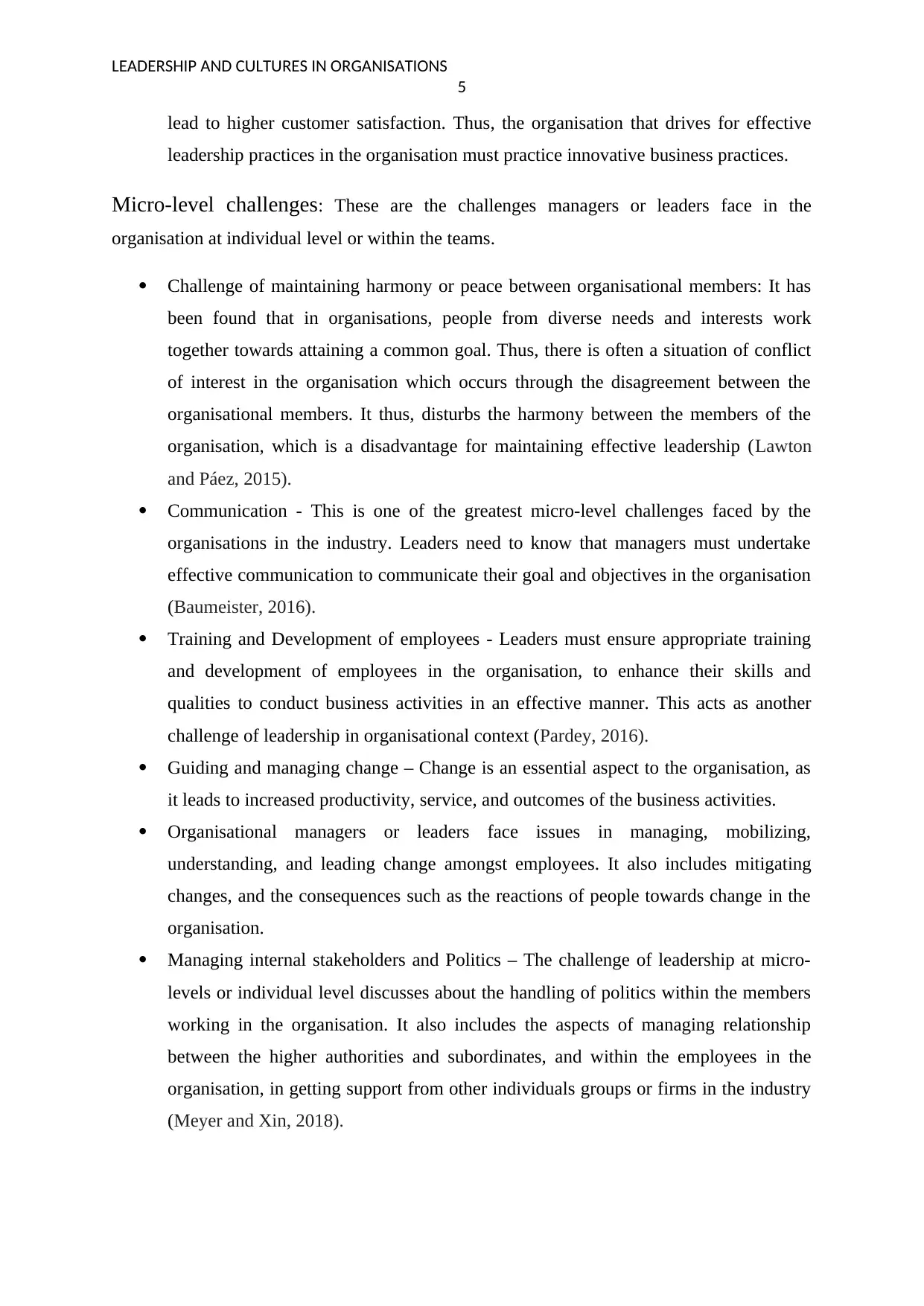
LEADERSHIP AND CULTURES IN ORGANISATIONS
5
lead to higher customer satisfaction. Thus, the organisation that drives for effective
leadership practices in the organisation must practice innovative business practices.
Micro-level challenges: These are the challenges managers or leaders face in the
organisation at individual level or within the teams.
Challenge of maintaining harmony or peace between organisational members: It has
been found that in organisations, people from diverse needs and interests work
together towards attaining a common goal. Thus, there is often a situation of conflict
of interest in the organisation which occurs through the disagreement between the
organisational members. It thus, disturbs the harmony between the members of the
organisation, which is a disadvantage for maintaining effective leadership (Lawton
and Páez, 2015).
Communication - This is one of the greatest micro-level challenges faced by the
organisations in the industry. Leaders need to know that managers must undertake
effective communication to communicate their goal and objectives in the organisation
(Baumeister, 2016).
Training and Development of employees - Leaders must ensure appropriate training
and development of employees in the organisation, to enhance their skills and
qualities to conduct business activities in an effective manner. This acts as another
challenge of leadership in organisational context (Pardey, 2016).
Guiding and managing change – Change is an essential aspect to the organisation, as
it leads to increased productivity, service, and outcomes of the business activities.
Organisational managers or leaders face issues in managing, mobilizing,
understanding, and leading change amongst employees. It also includes mitigating
changes, and the consequences such as the reactions of people towards change in the
organisation.
Managing internal stakeholders and Politics – The challenge of leadership at micro-
levels or individual level discusses about the handling of politics within the members
working in the organisation. It also includes the aspects of managing relationship
between the higher authorities and subordinates, and within the employees in the
organisation, in getting support from other individuals groups or firms in the industry
(Meyer and Xin, 2018).
5
lead to higher customer satisfaction. Thus, the organisation that drives for effective
leadership practices in the organisation must practice innovative business practices.
Micro-level challenges: These are the challenges managers or leaders face in the
organisation at individual level or within the teams.
Challenge of maintaining harmony or peace between organisational members: It has
been found that in organisations, people from diverse needs and interests work
together towards attaining a common goal. Thus, there is often a situation of conflict
of interest in the organisation which occurs through the disagreement between the
organisational members. It thus, disturbs the harmony between the members of the
organisation, which is a disadvantage for maintaining effective leadership (Lawton
and Páez, 2015).
Communication - This is one of the greatest micro-level challenges faced by the
organisations in the industry. Leaders need to know that managers must undertake
effective communication to communicate their goal and objectives in the organisation
(Baumeister, 2016).
Training and Development of employees - Leaders must ensure appropriate training
and development of employees in the organisation, to enhance their skills and
qualities to conduct business activities in an effective manner. This acts as another
challenge of leadership in organisational context (Pardey, 2016).
Guiding and managing change – Change is an essential aspect to the organisation, as
it leads to increased productivity, service, and outcomes of the business activities.
Organisational managers or leaders face issues in managing, mobilizing,
understanding, and leading change amongst employees. It also includes mitigating
changes, and the consequences such as the reactions of people towards change in the
organisation.
Managing internal stakeholders and Politics – The challenge of leadership at micro-
levels or individual level discusses about the handling of politics within the members
working in the organisation. It also includes the aspects of managing relationship
between the higher authorities and subordinates, and within the employees in the
organisation, in getting support from other individuals groups or firms in the industry
(Meyer and Xin, 2018).
⊘ This is a preview!⊘
Do you want full access?
Subscribe today to unlock all pages.

Trusted by 1+ million students worldwide
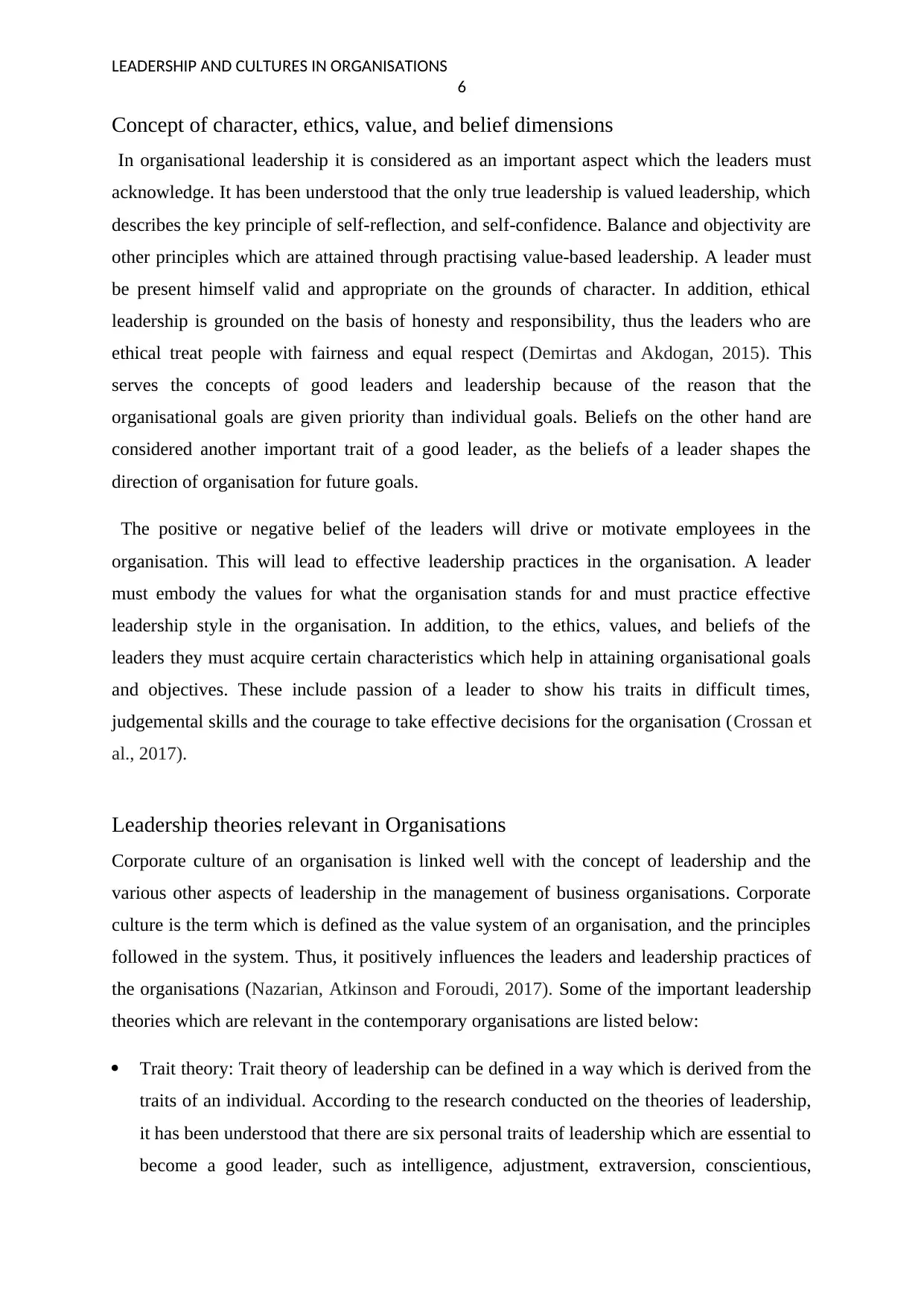
LEADERSHIP AND CULTURES IN ORGANISATIONS
6
Concept of character, ethics, value, and belief dimensions
In organisational leadership it is considered as an important aspect which the leaders must
acknowledge. It has been understood that the only true leadership is valued leadership, which
describes the key principle of self-reflection, and self-confidence. Balance and objectivity are
other principles which are attained through practising value-based leadership. A leader must
be present himself valid and appropriate on the grounds of character. In addition, ethical
leadership is grounded on the basis of honesty and responsibility, thus the leaders who are
ethical treat people with fairness and equal respect (Demirtas and Akdogan, 2015). This
serves the concepts of good leaders and leadership because of the reason that the
organisational goals are given priority than individual goals. Beliefs on the other hand are
considered another important trait of a good leader, as the beliefs of a leader shapes the
direction of organisation for future goals.
The positive or negative belief of the leaders will drive or motivate employees in the
organisation. This will lead to effective leadership practices in the organisation. A leader
must embody the values for what the organisation stands for and must practice effective
leadership style in the organisation. In addition, to the ethics, values, and beliefs of the
leaders they must acquire certain characteristics which help in attaining organisational goals
and objectives. These include passion of a leader to show his traits in difficult times,
judgemental skills and the courage to take effective decisions for the organisation (Crossan et
al., 2017).
Leadership theories relevant in Organisations
Corporate culture of an organisation is linked well with the concept of leadership and the
various other aspects of leadership in the management of business organisations. Corporate
culture is the term which is defined as the value system of an organisation, and the principles
followed in the system. Thus, it positively influences the leaders and leadership practices of
the organisations (Nazarian, Atkinson and Foroudi, 2017). Some of the important leadership
theories which are relevant in the contemporary organisations are listed below:
Trait theory: Trait theory of leadership can be defined in a way which is derived from the
traits of an individual. According to the research conducted on the theories of leadership,
it has been understood that there are six personal traits of leadership which are essential to
become a good leader, such as intelligence, adjustment, extraversion, conscientious,
6
Concept of character, ethics, value, and belief dimensions
In organisational leadership it is considered as an important aspect which the leaders must
acknowledge. It has been understood that the only true leadership is valued leadership, which
describes the key principle of self-reflection, and self-confidence. Balance and objectivity are
other principles which are attained through practising value-based leadership. A leader must
be present himself valid and appropriate on the grounds of character. In addition, ethical
leadership is grounded on the basis of honesty and responsibility, thus the leaders who are
ethical treat people with fairness and equal respect (Demirtas and Akdogan, 2015). This
serves the concepts of good leaders and leadership because of the reason that the
organisational goals are given priority than individual goals. Beliefs on the other hand are
considered another important trait of a good leader, as the beliefs of a leader shapes the
direction of organisation for future goals.
The positive or negative belief of the leaders will drive or motivate employees in the
organisation. This will lead to effective leadership practices in the organisation. A leader
must embody the values for what the organisation stands for and must practice effective
leadership style in the organisation. In addition, to the ethics, values, and beliefs of the
leaders they must acquire certain characteristics which help in attaining organisational goals
and objectives. These include passion of a leader to show his traits in difficult times,
judgemental skills and the courage to take effective decisions for the organisation (Crossan et
al., 2017).
Leadership theories relevant in Organisations
Corporate culture of an organisation is linked well with the concept of leadership and the
various other aspects of leadership in the management of business organisations. Corporate
culture is the term which is defined as the value system of an organisation, and the principles
followed in the system. Thus, it positively influences the leaders and leadership practices of
the organisations (Nazarian, Atkinson and Foroudi, 2017). Some of the important leadership
theories which are relevant in the contemporary organisations are listed below:
Trait theory: Trait theory of leadership can be defined in a way which is derived from the
traits of an individual. According to the research conducted on the theories of leadership,
it has been understood that there are six personal traits of leadership which are essential to
become a good leader, such as intelligence, adjustment, extraversion, conscientious,
Paraphrase This Document
Need a fresh take? Get an instant paraphrase of this document with our AI Paraphraser
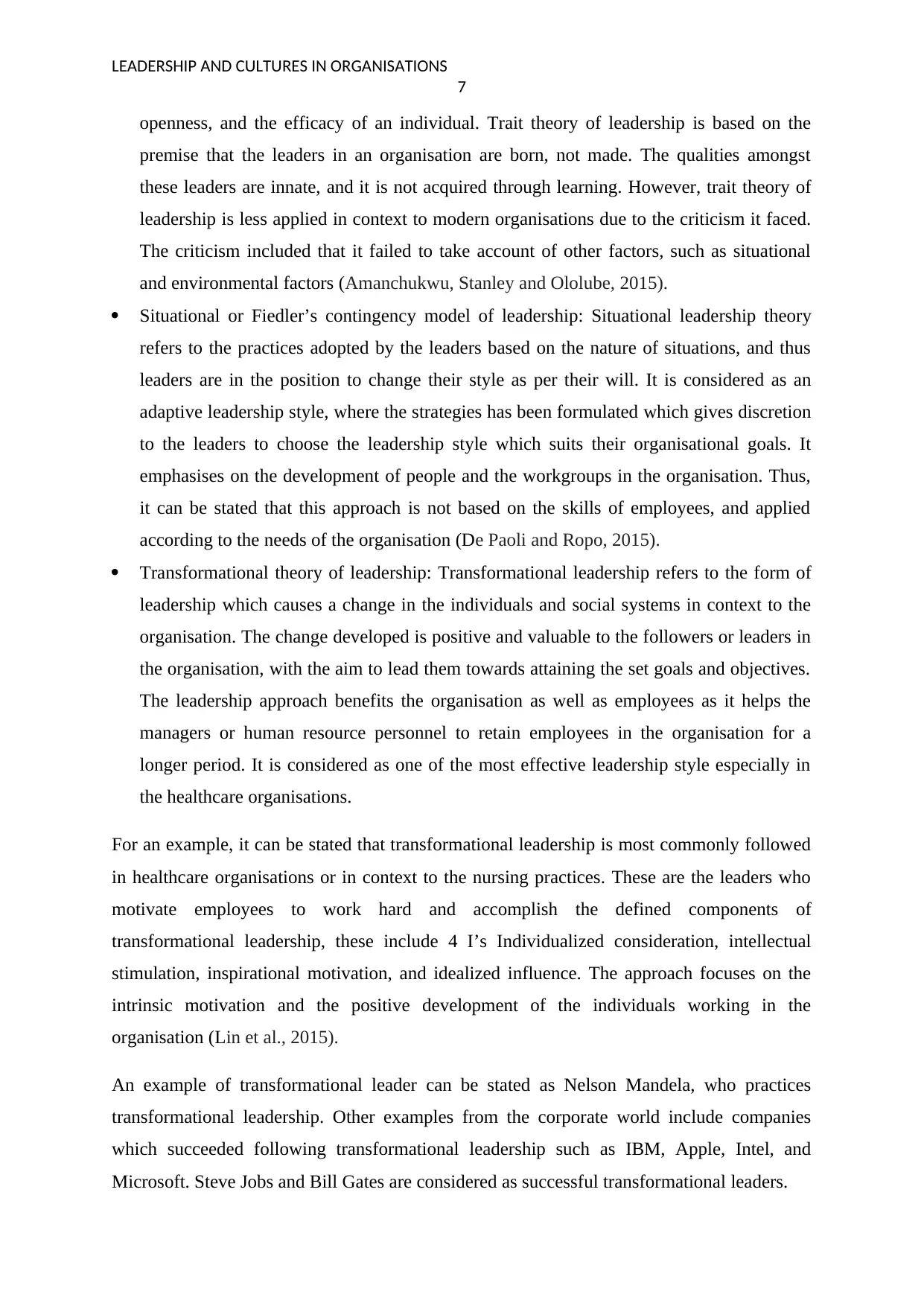
LEADERSHIP AND CULTURES IN ORGANISATIONS
7
openness, and the efficacy of an individual. Trait theory of leadership is based on the
premise that the leaders in an organisation are born, not made. The qualities amongst
these leaders are innate, and it is not acquired through learning. However, trait theory of
leadership is less applied in context to modern organisations due to the criticism it faced.
The criticism included that it failed to take account of other factors, such as situational
and environmental factors (Amanchukwu, Stanley and Ololube, 2015).
Situational or Fiedler’s contingency model of leadership: Situational leadership theory
refers to the practices adopted by the leaders based on the nature of situations, and thus
leaders are in the position to change their style as per their will. It is considered as an
adaptive leadership style, where the strategies has been formulated which gives discretion
to the leaders to choose the leadership style which suits their organisational goals. It
emphasises on the development of people and the workgroups in the organisation. Thus,
it can be stated that this approach is not based on the skills of employees, and applied
according to the needs of the organisation (De Paoli and Ropo, 2015).
Transformational theory of leadership: Transformational leadership refers to the form of
leadership which causes a change in the individuals and social systems in context to the
organisation. The change developed is positive and valuable to the followers or leaders in
the organisation, with the aim to lead them towards attaining the set goals and objectives.
The leadership approach benefits the organisation as well as employees as it helps the
managers or human resource personnel to retain employees in the organisation for a
longer period. It is considered as one of the most effective leadership style especially in
the healthcare organisations.
For an example, it can be stated that transformational leadership is most commonly followed
in healthcare organisations or in context to the nursing practices. These are the leaders who
motivate employees to work hard and accomplish the defined components of
transformational leadership, these include 4 I’s Individualized consideration, intellectual
stimulation, inspirational motivation, and idealized influence. The approach focuses on the
intrinsic motivation and the positive development of the individuals working in the
organisation (Lin et al., 2015).
An example of transformational leader can be stated as Nelson Mandela, who practices
transformational leadership. Other examples from the corporate world include companies
which succeeded following transformational leadership such as IBM, Apple, Intel, and
Microsoft. Steve Jobs and Bill Gates are considered as successful transformational leaders.
7
openness, and the efficacy of an individual. Trait theory of leadership is based on the
premise that the leaders in an organisation are born, not made. The qualities amongst
these leaders are innate, and it is not acquired through learning. However, trait theory of
leadership is less applied in context to modern organisations due to the criticism it faced.
The criticism included that it failed to take account of other factors, such as situational
and environmental factors (Amanchukwu, Stanley and Ololube, 2015).
Situational or Fiedler’s contingency model of leadership: Situational leadership theory
refers to the practices adopted by the leaders based on the nature of situations, and thus
leaders are in the position to change their style as per their will. It is considered as an
adaptive leadership style, where the strategies has been formulated which gives discretion
to the leaders to choose the leadership style which suits their organisational goals. It
emphasises on the development of people and the workgroups in the organisation. Thus,
it can be stated that this approach is not based on the skills of employees, and applied
according to the needs of the organisation (De Paoli and Ropo, 2015).
Transformational theory of leadership: Transformational leadership refers to the form of
leadership which causes a change in the individuals and social systems in context to the
organisation. The change developed is positive and valuable to the followers or leaders in
the organisation, with the aim to lead them towards attaining the set goals and objectives.
The leadership approach benefits the organisation as well as employees as it helps the
managers or human resource personnel to retain employees in the organisation for a
longer period. It is considered as one of the most effective leadership style especially in
the healthcare organisations.
For an example, it can be stated that transformational leadership is most commonly followed
in healthcare organisations or in context to the nursing practices. These are the leaders who
motivate employees to work hard and accomplish the defined components of
transformational leadership, these include 4 I’s Individualized consideration, intellectual
stimulation, inspirational motivation, and idealized influence. The approach focuses on the
intrinsic motivation and the positive development of the individuals working in the
organisation (Lin et al., 2015).
An example of transformational leader can be stated as Nelson Mandela, who practices
transformational leadership. Other examples from the corporate world include companies
which succeeded following transformational leadership such as IBM, Apple, Intel, and
Microsoft. Steve Jobs and Bill Gates are considered as successful transformational leaders.
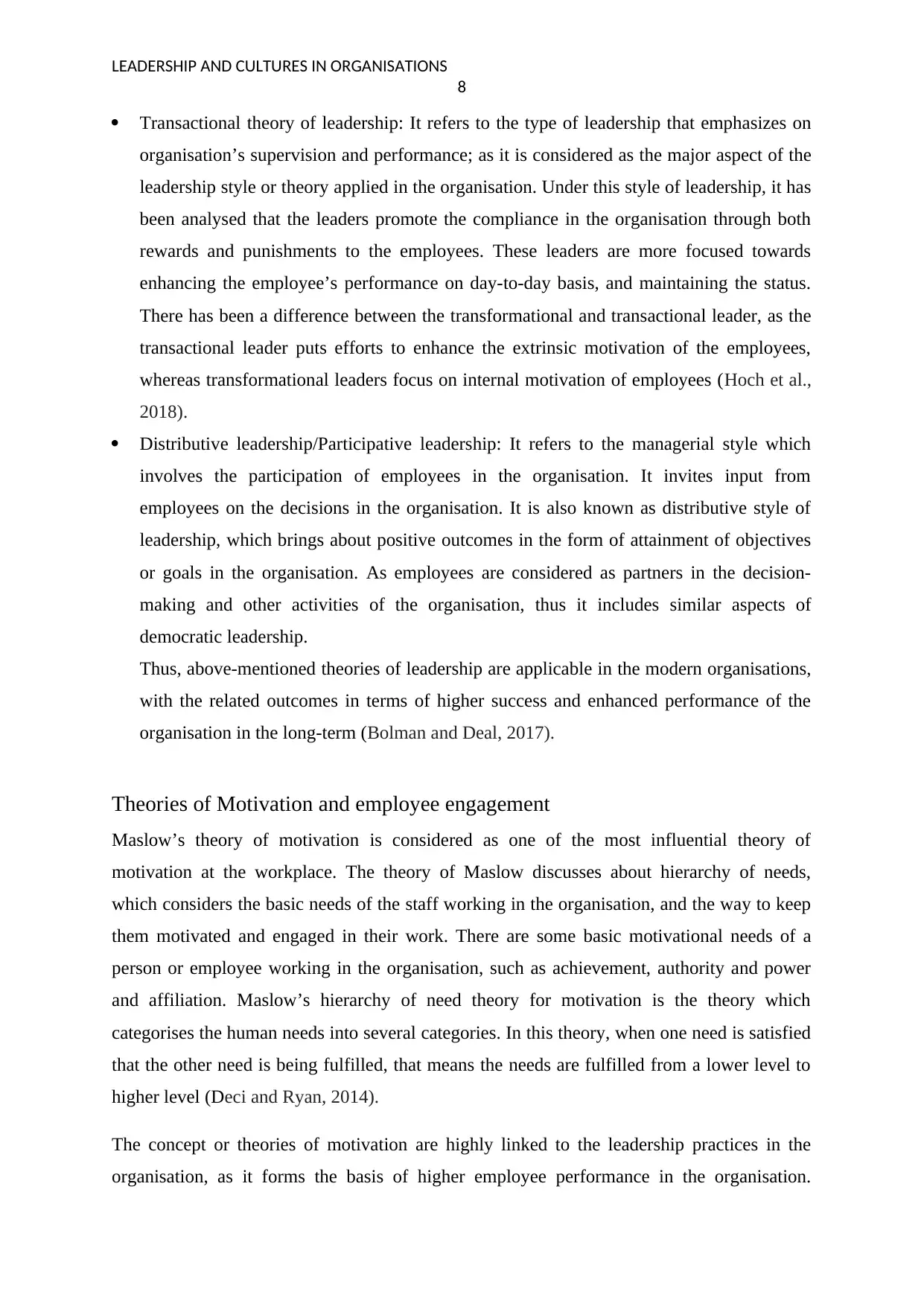
LEADERSHIP AND CULTURES IN ORGANISATIONS
8
Transactional theory of leadership: It refers to the type of leadership that emphasizes on
organisation’s supervision and performance; as it is considered as the major aspect of the
leadership style or theory applied in the organisation. Under this style of leadership, it has
been analysed that the leaders promote the compliance in the organisation through both
rewards and punishments to the employees. These leaders are more focused towards
enhancing the employee’s performance on day-to-day basis, and maintaining the status.
There has been a difference between the transformational and transactional leader, as the
transactional leader puts efforts to enhance the extrinsic motivation of the employees,
whereas transformational leaders focus on internal motivation of employees (Hoch et al.,
2018).
Distributive leadership/Participative leadership: It refers to the managerial style which
involves the participation of employees in the organisation. It invites input from
employees on the decisions in the organisation. It is also known as distributive style of
leadership, which brings about positive outcomes in the form of attainment of objectives
or goals in the organisation. As employees are considered as partners in the decision-
making and other activities of the organisation, thus it includes similar aspects of
democratic leadership.
Thus, above-mentioned theories of leadership are applicable in the modern organisations,
with the related outcomes in terms of higher success and enhanced performance of the
organisation in the long-term (Bolman and Deal, 2017).
Theories of Motivation and employee engagement
Maslow’s theory of motivation is considered as one of the most influential theory of
motivation at the workplace. The theory of Maslow discusses about hierarchy of needs,
which considers the basic needs of the staff working in the organisation, and the way to keep
them motivated and engaged in their work. There are some basic motivational needs of a
person or employee working in the organisation, such as achievement, authority and power
and affiliation. Maslow’s hierarchy of need theory for motivation is the theory which
categorises the human needs into several categories. In this theory, when one need is satisfied
that the other need is being fulfilled, that means the needs are fulfilled from a lower level to
higher level (Deci and Ryan, 2014).
The concept or theories of motivation are highly linked to the leadership practices in the
organisation, as it forms the basis of higher employee performance in the organisation.
8
Transactional theory of leadership: It refers to the type of leadership that emphasizes on
organisation’s supervision and performance; as it is considered as the major aspect of the
leadership style or theory applied in the organisation. Under this style of leadership, it has
been analysed that the leaders promote the compliance in the organisation through both
rewards and punishments to the employees. These leaders are more focused towards
enhancing the employee’s performance on day-to-day basis, and maintaining the status.
There has been a difference between the transformational and transactional leader, as the
transactional leader puts efforts to enhance the extrinsic motivation of the employees,
whereas transformational leaders focus on internal motivation of employees (Hoch et al.,
2018).
Distributive leadership/Participative leadership: It refers to the managerial style which
involves the participation of employees in the organisation. It invites input from
employees on the decisions in the organisation. It is also known as distributive style of
leadership, which brings about positive outcomes in the form of attainment of objectives
or goals in the organisation. As employees are considered as partners in the decision-
making and other activities of the organisation, thus it includes similar aspects of
democratic leadership.
Thus, above-mentioned theories of leadership are applicable in the modern organisations,
with the related outcomes in terms of higher success and enhanced performance of the
organisation in the long-term (Bolman and Deal, 2017).
Theories of Motivation and employee engagement
Maslow’s theory of motivation is considered as one of the most influential theory of
motivation at the workplace. The theory of Maslow discusses about hierarchy of needs,
which considers the basic needs of the staff working in the organisation, and the way to keep
them motivated and engaged in their work. There are some basic motivational needs of a
person or employee working in the organisation, such as achievement, authority and power
and affiliation. Maslow’s hierarchy of need theory for motivation is the theory which
categorises the human needs into several categories. In this theory, when one need is satisfied
that the other need is being fulfilled, that means the needs are fulfilled from a lower level to
higher level (Deci and Ryan, 2014).
The concept or theories of motivation are highly linked to the leadership practices in the
organisation, as it forms the basis of higher employee performance in the organisation.
⊘ This is a preview!⊘
Do you want full access?
Subscribe today to unlock all pages.

Trusted by 1+ million students worldwide
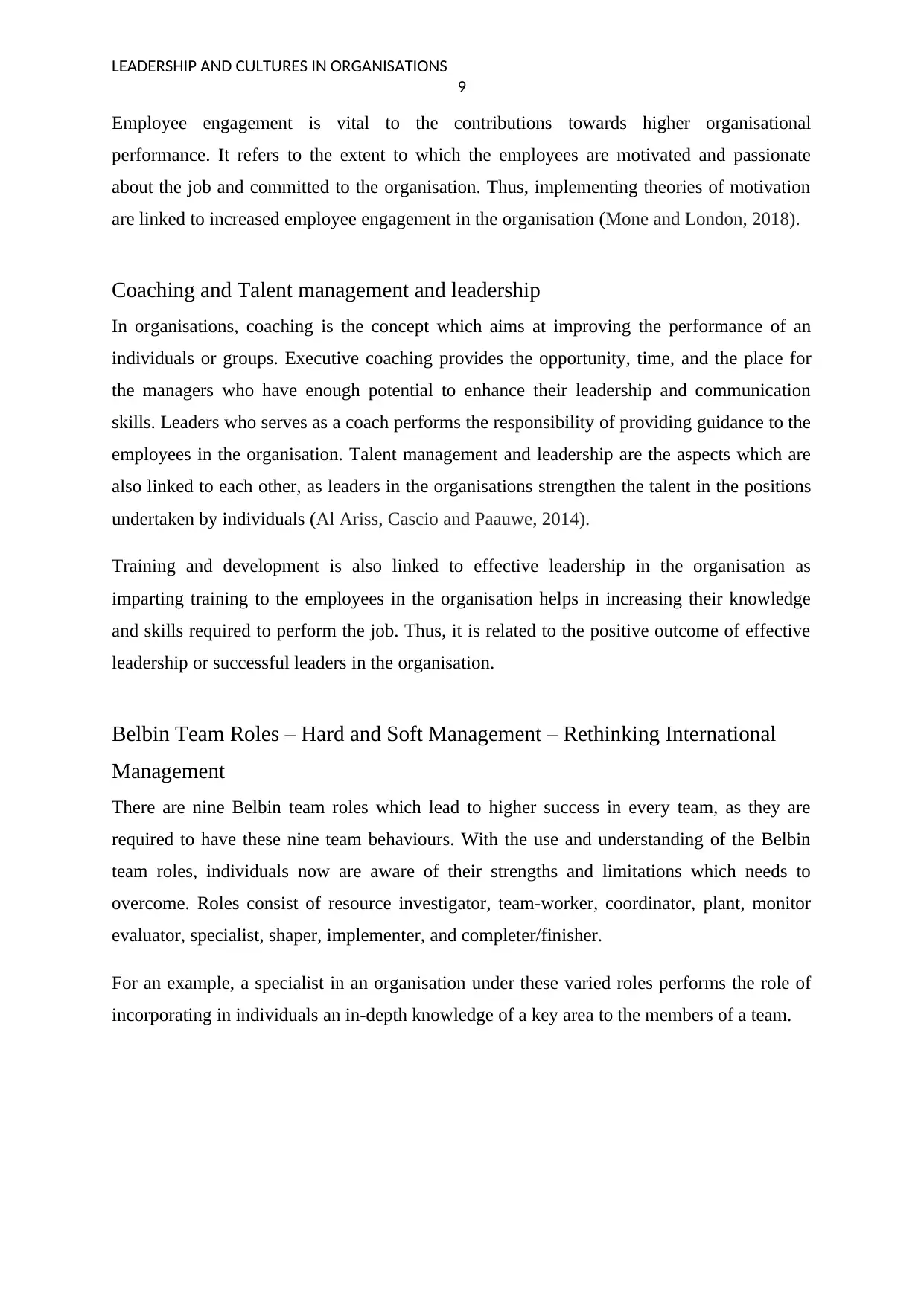
LEADERSHIP AND CULTURES IN ORGANISATIONS
9
Employee engagement is vital to the contributions towards higher organisational
performance. It refers to the extent to which the employees are motivated and passionate
about the job and committed to the organisation. Thus, implementing theories of motivation
are linked to increased employee engagement in the organisation (Mone and London, 2018).
Coaching and Talent management and leadership
In organisations, coaching is the concept which aims at improving the performance of an
individuals or groups. Executive coaching provides the opportunity, time, and the place for
the managers who have enough potential to enhance their leadership and communication
skills. Leaders who serves as a coach performs the responsibility of providing guidance to the
employees in the organisation. Talent management and leadership are the aspects which are
also linked to each other, as leaders in the organisations strengthen the talent in the positions
undertaken by individuals (Al Ariss, Cascio and Paauwe, 2014).
Training and development is also linked to effective leadership in the organisation as
imparting training to the employees in the organisation helps in increasing their knowledge
and skills required to perform the job. Thus, it is related to the positive outcome of effective
leadership or successful leaders in the organisation.
Belbin Team Roles – Hard and Soft Management – Rethinking International
Management
There are nine Belbin team roles which lead to higher success in every team, as they are
required to have these nine team behaviours. With the use and understanding of the Belbin
team roles, individuals now are aware of their strengths and limitations which needs to
overcome. Roles consist of resource investigator, team-worker, coordinator, plant, monitor
evaluator, specialist, shaper, implementer, and completer/finisher.
For an example, a specialist in an organisation under these varied roles performs the role of
incorporating in individuals an in-depth knowledge of a key area to the members of a team.
9
Employee engagement is vital to the contributions towards higher organisational
performance. It refers to the extent to which the employees are motivated and passionate
about the job and committed to the organisation. Thus, implementing theories of motivation
are linked to increased employee engagement in the organisation (Mone and London, 2018).
Coaching and Talent management and leadership
In organisations, coaching is the concept which aims at improving the performance of an
individuals or groups. Executive coaching provides the opportunity, time, and the place for
the managers who have enough potential to enhance their leadership and communication
skills. Leaders who serves as a coach performs the responsibility of providing guidance to the
employees in the organisation. Talent management and leadership are the aspects which are
also linked to each other, as leaders in the organisations strengthen the talent in the positions
undertaken by individuals (Al Ariss, Cascio and Paauwe, 2014).
Training and development is also linked to effective leadership in the organisation as
imparting training to the employees in the organisation helps in increasing their knowledge
and skills required to perform the job. Thus, it is related to the positive outcome of effective
leadership or successful leaders in the organisation.
Belbin Team Roles – Hard and Soft Management – Rethinking International
Management
There are nine Belbin team roles which lead to higher success in every team, as they are
required to have these nine team behaviours. With the use and understanding of the Belbin
team roles, individuals now are aware of their strengths and limitations which needs to
overcome. Roles consist of resource investigator, team-worker, coordinator, plant, monitor
evaluator, specialist, shaper, implementer, and completer/finisher.
For an example, a specialist in an organisation under these varied roles performs the role of
incorporating in individuals an in-depth knowledge of a key area to the members of a team.
Paraphrase This Document
Need a fresh take? Get an instant paraphrase of this document with our AI Paraphraser
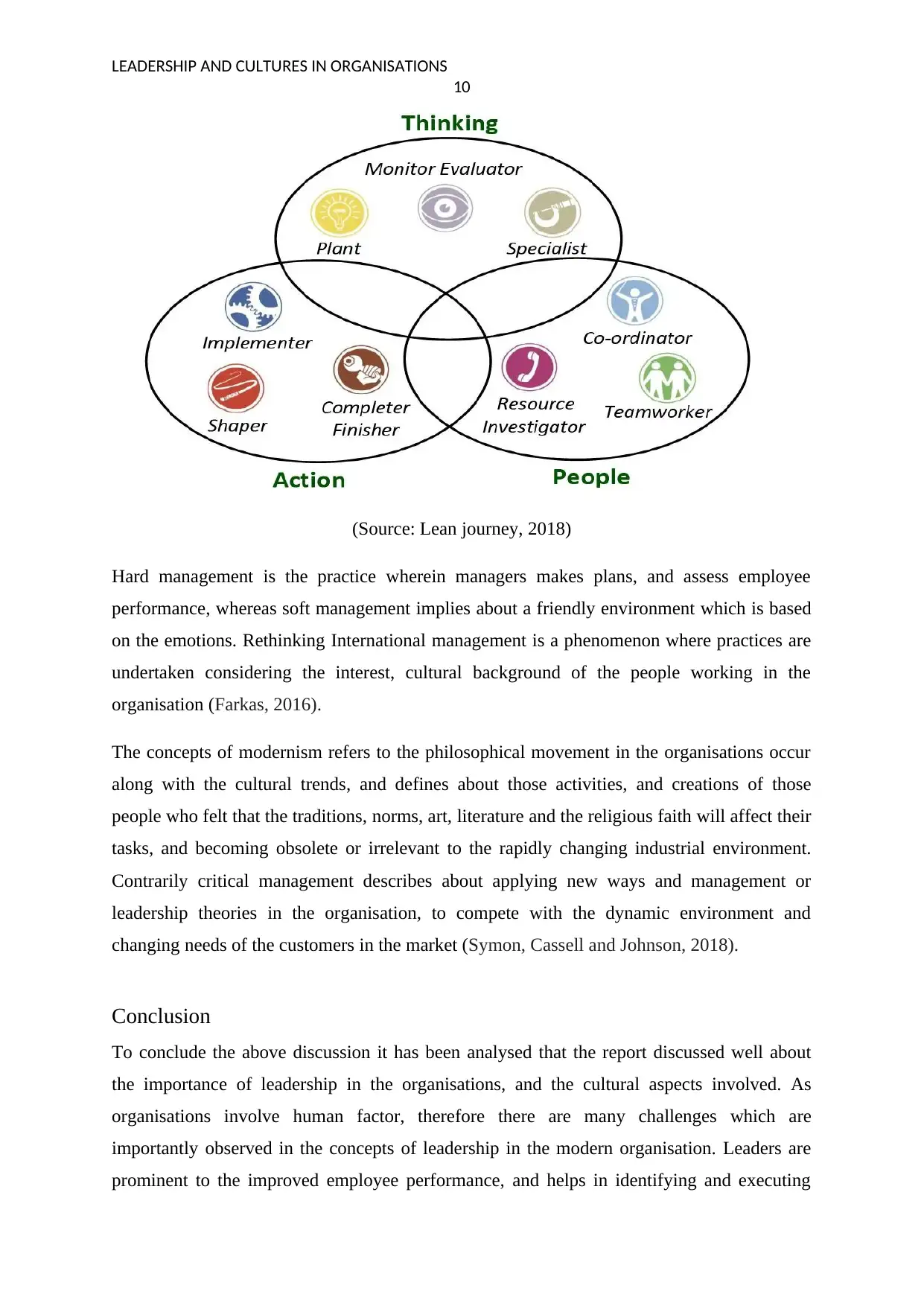
LEADERSHIP AND CULTURES IN ORGANISATIONS
10
(Source: Lean journey, 2018)
Hard management is the practice wherein managers makes plans, and assess employee
performance, whereas soft management implies about a friendly environment which is based
on the emotions. Rethinking International management is a phenomenon where practices are
undertaken considering the interest, cultural background of the people working in the
organisation (Farkas, 2016).
The concepts of modernism refers to the philosophical movement in the organisations occur
along with the cultural trends, and defines about those activities, and creations of those
people who felt that the traditions, norms, art, literature and the religious faith will affect their
tasks, and becoming obsolete or irrelevant to the rapidly changing industrial environment.
Contrarily critical management describes about applying new ways and management or
leadership theories in the organisation, to compete with the dynamic environment and
changing needs of the customers in the market (Symon, Cassell and Johnson, 2018).
Conclusion
To conclude the above discussion it has been analysed that the report discussed well about
the importance of leadership in the organisations, and the cultural aspects involved. As
organisations involve human factor, therefore there are many challenges which are
importantly observed in the concepts of leadership in the modern organisation. Leaders are
prominent to the improved employee performance, and helps in identifying and executing
10
(Source: Lean journey, 2018)
Hard management is the practice wherein managers makes plans, and assess employee
performance, whereas soft management implies about a friendly environment which is based
on the emotions. Rethinking International management is a phenomenon where practices are
undertaken considering the interest, cultural background of the people working in the
organisation (Farkas, 2016).
The concepts of modernism refers to the philosophical movement in the organisations occur
along with the cultural trends, and defines about those activities, and creations of those
people who felt that the traditions, norms, art, literature and the religious faith will affect their
tasks, and becoming obsolete or irrelevant to the rapidly changing industrial environment.
Contrarily critical management describes about applying new ways and management or
leadership theories in the organisation, to compete with the dynamic environment and
changing needs of the customers in the market (Symon, Cassell and Johnson, 2018).
Conclusion
To conclude the above discussion it has been analysed that the report discussed well about
the importance of leadership in the organisations, and the cultural aspects involved. As
organisations involve human factor, therefore there are many challenges which are
importantly observed in the concepts of leadership in the modern organisation. Leaders are
prominent to the improved employee performance, and helps in identifying and executing
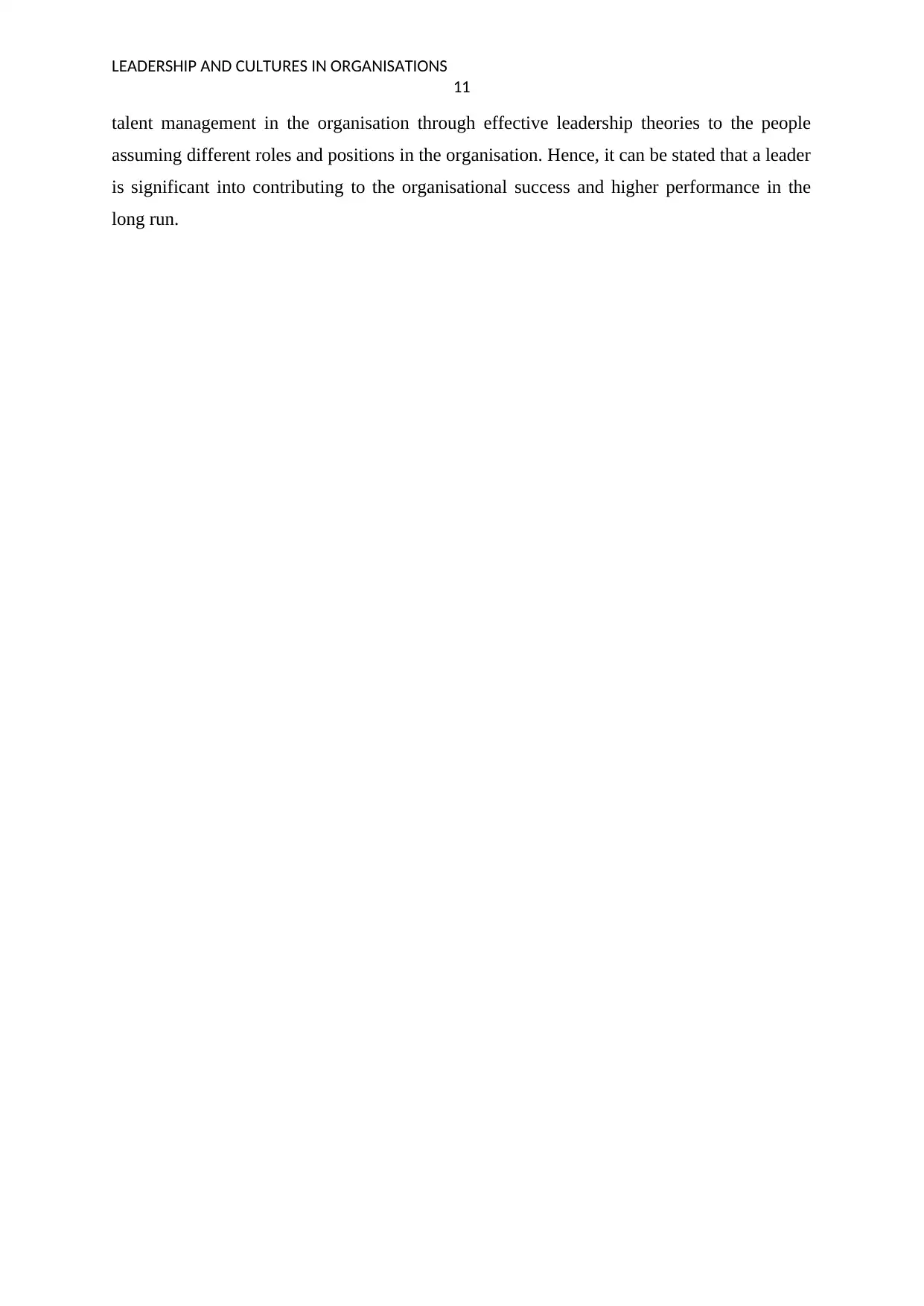
LEADERSHIP AND CULTURES IN ORGANISATIONS
11
talent management in the organisation through effective leadership theories to the people
assuming different roles and positions in the organisation. Hence, it can be stated that a leader
is significant into contributing to the organisational success and higher performance in the
long run.
11
talent management in the organisation through effective leadership theories to the people
assuming different roles and positions in the organisation. Hence, it can be stated that a leader
is significant into contributing to the organisational success and higher performance in the
long run.
⊘ This is a preview!⊘
Do you want full access?
Subscribe today to unlock all pages.

Trusted by 1+ million students worldwide
1 out of 15
Related Documents
Your All-in-One AI-Powered Toolkit for Academic Success.
+13062052269
info@desklib.com
Available 24*7 on WhatsApp / Email
![[object Object]](/_next/static/media/star-bottom.7253800d.svg)
Unlock your academic potential
Copyright © 2020–2026 A2Z Services. All Rights Reserved. Developed and managed by ZUCOL.





